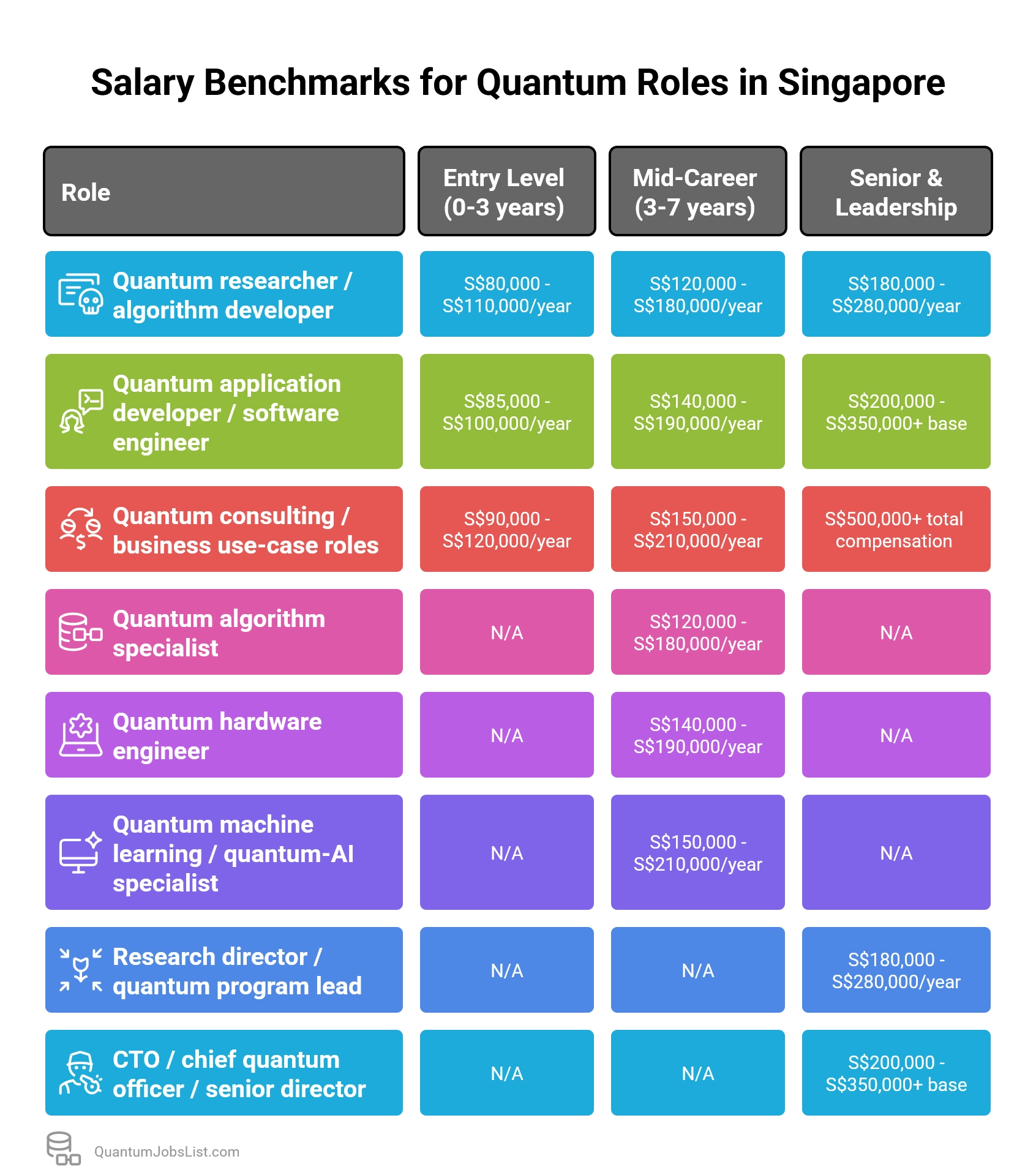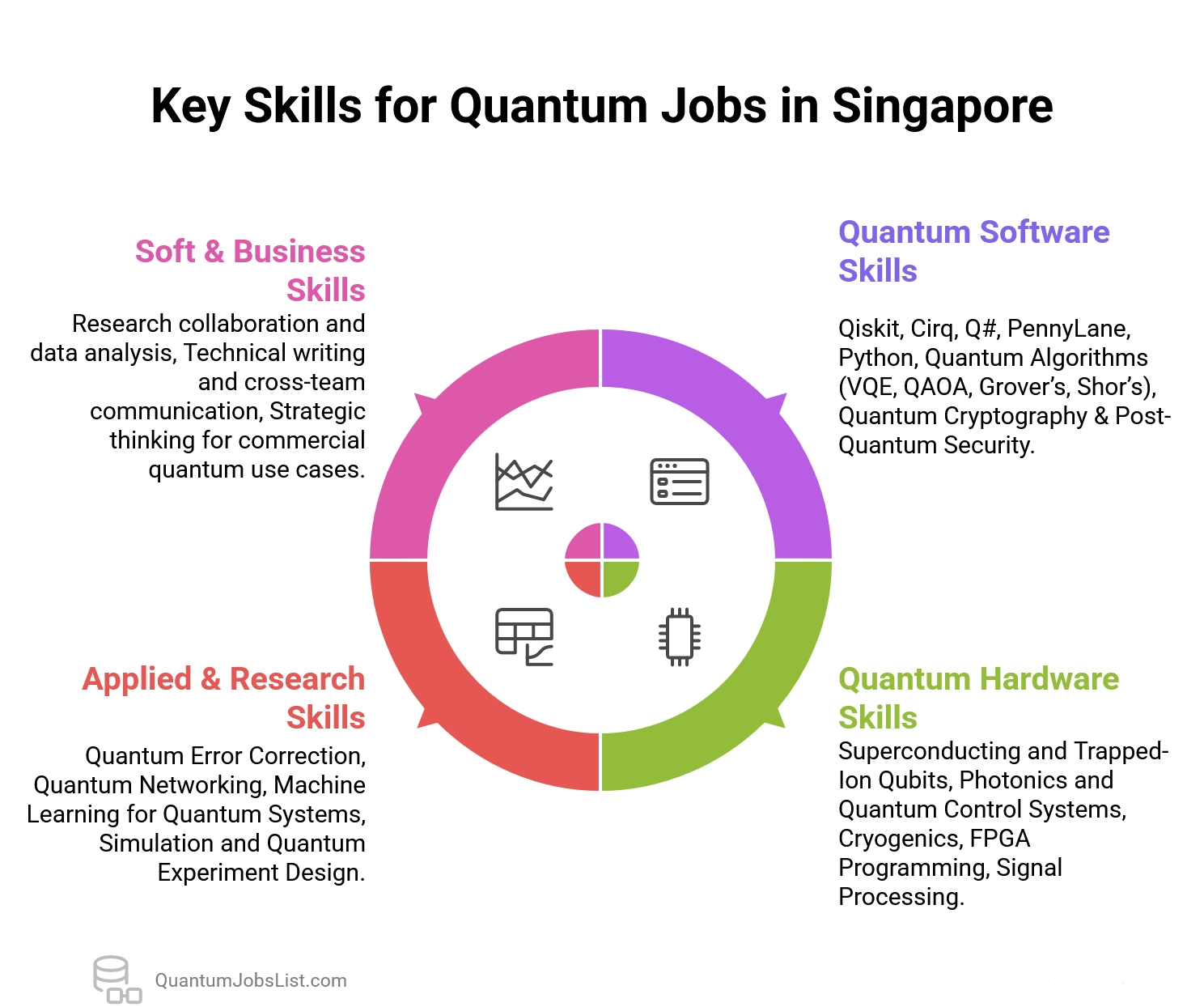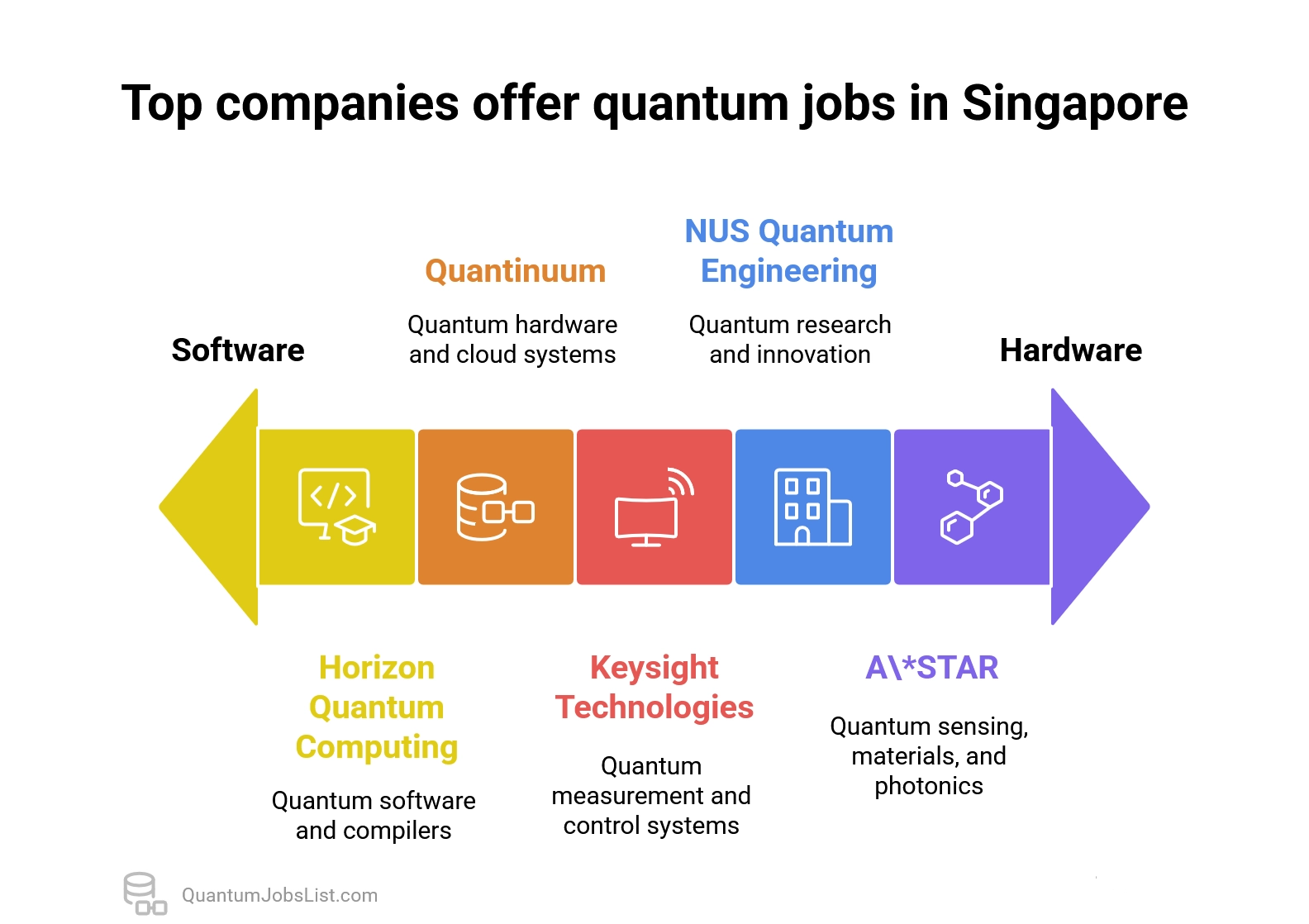Quantum Jobs List
Quantum Computing Jobs Singapore
The quantum computing job market in Singapore is expanding fast, offering roles in software, hardware, and research. Explore salaries, skills, and top employers.
What Is Quantum Computing?
Quantum computing uses principles of superposition and entanglement to tackle complex problems that classical computers struggle to fix effectively. With marked government investment and top-notch research institutes, Singapore, the first National Quantum Hub in Asia, is shaping the region's thriving quantum computing start-ups and transforming industries in advanced drug formulation, financial services, cryptography, and materials science.
Through national programmes coordinated by NQO, we are translating research into applications, anchoring partnerships with global leaders & creating early pathways for industry adoption. Ling Keok Tong, Executive Director, National Quantum Office, Singapore.
Why Singapore Leads Quantum in Asia-Pacific?
Singapore has been engaged in quantum research since 1998 and is among the first in Asia to adopt the technology. The National Quantum Strategy announcement in May 2024 marked an investment of S$300 million (approximately $219 million USD) towards this goal under the 2025 Research, Innovation, and Enterprise plan. The 25 years of sustained investment, not just in research and publications, have led to strong institutional knowledge not easily built by newer entrants, as the funding is aimed towards constructing the country's quantum ecosystem, not just the fundamental science.
The Centre for Quantum Technologies is key to Singapore's success in quantum technology. It started in 2007 and has grown into one of the largest research facilities for quantum studies in the world. CQT includes over 250 quantum computing, quantum communication, and quantum sensing specialists, including physicists, computer scientists, and engineers. The center continues to conduct pioneering research in quantum neutral cryptography, quantum algorithms, and quantum hardware and has successfully launched several commercially viable initiatives that have gained global market access.
Singapore's strong position as a business-friendly country makes it an important link between research and commercialization. Many quantum research hubs lack this connection. The government provides quantum technology start-ups with generous seed capital and promotes research collaboration between the private sector and universities, regulatory policies that foster innovation, and protect embedded intellectual property.
Given that Singapore is the leading technological and financial centre of Asia, quantum technology has the potential to be tested and commercially deployed in the rapidly growing economies of Southeast Asia, India, and China.
.webp)
Job Market Outlook in Singapore
The quantum job market in Singapore is growing, with opportunities in software, hardware, and research. Demand for skilled professionals is rising across tech and research hubs.
Current Landscape
Over the past year, the job market in Singapore's quantum sector has expanded considerably. Currently, there are between 32 and 56 employment opportunities in the quantum computing field. There are more than 42 quantum-related job advertisements on LinkedIn and Quantum Jobs List, indicating high demand from both large and new companies.
As the leading quantum hub in the region, Singapore has established an ecosystem of 13 specialized quantum computing start-ups, with several large foreign companies establishing quantum computing operations. This makes Singapore the main entry point for quantum technology in Southeast Asia's developing economies.
The Singapore government has made a strategic decision to focus on quantum computing. As a result, there are many opportunities for innovation in this field in Singapore. Singapore's competitors in the region, despite being close, do not have the world-class research and capitalist environment that Singapore has, leading to the global recruitment of high-skilled professionals and massive investments.
Growth Projections
Singapore's quantum industry is set to grow following the announcement of a S$300 million National Quantum Strategy in May 2024. S$300 million will be allocated to quantum research, commercialization, and workforce development over the next 5 to 10 years, and this amount will be disbursed through the Research, Innovation, and Enterprise 2025 plan. This funding display demonstrates Singapore's commitment to quantum computing and its willingness to continue to be a leader in the field even as the technology advances from the experimental stages.
Quantum technology is expected to move out of research facilities, and Singapore shows signs of being ready to tackle the challenges of the upcoming years. As potential commercial value increases, the technology will definitely require an increased workforce.
To lead in technology commercialization, we need to develop talent in quantum fields. The National Quantum Scholarships Scheme (NQSS) wants to create 100 PhD graduates and 100 Master’s graduates in quantum studies over the next five years. This development will ensure a locally trained workforce while also being able to attract global talent. This will ensure Singapore attracts both local and global talent.
In response to Singapore's emphasis on quantum technology, major companies are establishing specialized teams and conducting research. HSBC has developed a quantum computing research team for financial applications, and Quantinuum has established an R&D and Operations Center, which will expand research in computational biology, finance, chemistry, and optimization. In Singapore, NVIDIA is growing its quantum AI technology, and Keysight Technologies is working on solutions in quantum engineering.
Even traditional financial institutions such as OCBC Bank are investing in quantum technology research and training for collaboration, and this indicates that quantum computing is moving from pure research to practical use in enterprises.
Industry Demand
In Singapore, quantum technology is creating new quantum jobs and opportunities in various industries, not just in companies that specialize in quantum computing. This shows how important quantum technology is becoming in traditional sectors. In financial services, major banks like HSBC, OCBC, and DBS have established quantum research teams. These teams are working on innovative solutions for corporate portfolio optimization and restructuring financial risk models for fraud detection. The scope of this work goes beyond token preliminary research. The financial services industry needs to understand quantum computing and its competitive edge for rapid, advanced algorithmic trading and financial modeling.
Singapore has great potential for using quantum technology in healthcare and the pharmaceutical industry. This is especially true for drug discovery and molecular modeling. Quantum computers can affect how molecules interact, something that classical computers struggle to do.
Singapore's strong biomedical research base, anchored by the likes of A*STAR's Biomedical Research Council and many pharmaceutical firms, gives quantum chemistry applications a strong potential to be paired with strong research. Some pharmaceutical companies are recruiting quantum scientists who can align quantum algorithms to drug development workflows as a way of bridging the quantum gap.
Singapore is a key financial and communication center. To protect essential services like banking and government communications, it focuses on secure systems. The country is investing in quantum-safe cryptography and, as a result, is also prioritizing post-quantum cryptography.
The quantum recruiting market in Singapore has shifted to post-quantum cryptography and quantum-safe cryptography, particularly quantum key distribution systems.
Logistics and supply chain companies are using quantum optimization algorithms to handle Singapore's challenges as a major global shipping corner. Even traditional sectors like aerospace, advanced manufacturing, and energy are hiring quantum specialists. These often partner with research institutions to find relevant quantum applications.
National Quantum Strategy Initiatives
The National Quantum Strategy includes four major initiatives: the Centre for Quantum Technologies (CQT), the Quantum Engineering Programme 3.0 (QEP 3.0), the National Quantum Processor Initiative (NQPI) and National Quantum Scholarships Scheme (NQSS).
- Scientific Excellence: CQT has been upgraded to a flagship national R&D centre with nodes at partner institutions including A*STAR, NUS, NTU, and SUTD.
- Engineering Capabilities: Development of quantum processors, sensors, and quantum-safe networks.
- Talent Development: Scholarships and training programs to build a quantum-ready workforce.
- Innovation & Enterprise: Strong industry partnerships and startup ecosystem support.
Academic Pipeline
Singapore's universities are at the forefront of quantum education:
- Leading Research Centers: The Centre for Quantum Technologies (CQT) is Singapore's flagship national centre for quantum research and education, and is one of the largest centres dedicated to quantum technologies in the world.
- University Integration: CQT has nodes at the National University of Singapore (NUS), Nanyang Technological University (NTU), Singapore University of Technology and Design (SUTD), and A*STAR.
- Graduate Programs: Multiple PhD and Master's programs specializing in quantum computing, quantum information science, and quantum engineering.
- Industry Collaboration: Direct pathways from university research to industry through national programs and startup spin-offs.
Quantum Computing Jobs Singapore: Salary Ranges by Role
Quantum computing professionals in Singapore command competitive salaries. These reflect the specialized expertise required and Singapore's high standard of living. Salaries are generally quoted in Singapore Dollars (SGD).
Average Salary Overview
Quantum Computing Research Scientist: SGD $120,000 to $180,000 a year. This pay can vary depending on the specific company, level of experience and skills. You can learn more about Quantum Jobs salaries here.

Compensation Considerations
Tax-Friendly Environment:
- Singapore has relatively low personal income tax rates (0-22% progressive).
- Employer CPF (Central Provident Fund) contributions add 17% on top of salary.
- No capital gains tax on stock options/equity.
Additional Benefits:
- Annual Bonus: 1-3 months' salary, typical (13th-15th month pay)
- Stock Options/Equity: Common in startups (0.1% - 2% typical for early employees)
- Housing Allowance: Immigrants often receive SGD $2,000-5,000/month housing stipend.
- Comprehensive Benefits: Health insurance, dental coverage, annual leave (14-21 days)
- Relocation Support: Visa sponsorship and relocation packages for international hires.
Currency Context:
- 1 SGD ≈ 0.74 USD (exchange rates fluctuate).
- Singapore has a high purchasing power despite the high cost of living.
- Regional salary competitiveness makes Singapore attractive for Asian talent.
Salary data compiled from live job postings, JobzMall, Quantum Jobs List and industry reports.
What Key Skills and Degrees Needed for Quantum Jobs in Singapore?
Key skills for quantum jobs in Singapore include quantum programming, hardware control, and quantum algorithms. Degrees in physics, engineering, or computer science are highly valued.
Educational Requirements
Minimum Qualifications: You need a bachelor's degree in Physics, Computer Science, Electrical Engineering, Mathematics, or related field.
Preferred Qualifications:
- Master’s degree with a focus in quantum computing or related degrees like Physics, Computer Science, Computer Engineering, Electrical Engineering, or other related areas.
- Having a PhD in the specific field is preferred for research-oriented positions.
- Postdoctoral experience for senior research scientist and principal investigator positions.

What Are Top Singapore Universities with Quantum Programs?
National University of Singapore (NUS)
Centre for Quantum Technologies (CQT) - Flagship Program
- CQT was started in December 2007 as Singapore's first Research Centre of Excellence (RCE) hosted by NUS
- Master’s as well as PhD programs in quantum information science
- Fully funded CQT Scholarships with stipends and research allowances
- CQT has a joint graduate program with cutting-edge research opportunities in the quantum field
Physics Department
- Theoretical and experimental quantum research tracks
- Quantum mechanics, quantum optics and quantum information theory
Computer Science Department
- Quantum machine learning and quantum cryptography
- Quantum algorithms & computational complexity
Nanyang Technological University (NTU)
Quantum Research Programs
- CQT has research nodes at NTU
- Working on research in quantum materials, quantum devices, and quantum sensing.
- Having a strong emphasis on applied quantum technologies
- Partnerships with industry for translational research
School of Physical and Mathematical Sciences
- Quantum physics & quantum information courses
- Experimental quantum research facilities
Singapore University of Technology and Design (SUTD)
Research Quantum Computing:
- CQT has research nodes at SUTD
- Working on applied research for quantum computing and quantum engineering
- Industry-driven research on quantum technologies
- Partnerships with quantum startups and tech companies
Engineering Systems and Design:
- Quantum algorithm development
- Quantum software engineering
Agency for Science, Technology and Research (A*STAR)
While it is not a university, A*STAR institutes collaborate extensively with universities.
Institute of High Performance Computing (IHPC):
- Research positions in quantum computing and quantum simulation
- Research in quantum-classical hybrid computing.
Other A*STAR Institutes are: Bioinformatics Institute: Quantum applications in computational biology, Data Storage Institute: Quantum information storage, Institute of Materials Research and Engineering: Quantum materials.
What are the Top Skills for Quantum Careers in Singapore?
Technical Skills
To get a quantum computing job, you must have some technical skills focused on combining advanced science knowledge with strong computational and problem-solving abilities. You can learn more about top Quantum programming languages here.
- Fundamentals of Quantum Mechanics: Knowing quantum states, superposition, entanglement, and quantum gates inside and out.
- Mathematics & Linear Algebra: Vector spaces, matrices, operations on matrices, eigenvalues, tensor products, complex analysis.
- Quantum Algorithms: Shor's, Grover's, VQE, QAOA, and quantum machine learning.
- Classical Computing: Algorithms, data structures, and a theory of computational complexity.
Hardware & Systems
Hardware and systems skills for quantum jobs in Singapore focus on understanding quantum devices, experimental setups and system-level integration. These are required for reliable performance.
- Quantum Hardware Platforms: Basic understanding of superconducting qubits, trapped ions, photonic systems, and quantum annealing.
- Error Correction & Mitigation: Quantum error correction codes and noise mitigation, techniques, and fault-tolerant quantum computing.
Applied Skills
Applied skills for quantum jobs in Singapore involve: Theory in real-world projects, testing solutions and improving quantum technologies through hands-on experience.
- Interdisciplinary Knowledge: Expertise in a field such as finance, chemistry, logistics, or cryptography.
- Communication Skills: Explaining quantum concepts to people outside of the field, and being part of the same globalization projects.
In-Demand Specializations
- Quantum Machine Learning: The fusion of AI, data science, and quantum computing.
- Quantum Error Correction: Pertains to fault-tolerant quantum computing and quantum control systems.
- Quantum Cryptography & Security: Incorporates post-quantum cryptography and quantum key distribution (QKD).
- Quantum Chemistry & Materials: Involves drug discovery, materials design, and molecular simulation.
- Quantum Sensing: Involves navigation, biomedical imaging, and environmental monitoring.
What Companies Hiring for Quantum Computing Jobs in Singapore?
Companies hiring for quantum computing roles in Singapore include research institutions, tech multinationals, and financial firms. Thee are offering positions in hardware, software, and applied quantum fields.
Major Quantum Employers
Quantum Startups (Singapore-Based)
Entropica Labs (Founded 2018):
- Develops an automation-first approach to quantum error correction with an integrated software stack covering the complete QEC lifecycle.
- Develops fault-tolerant quantum computing software.
- Clients include the BMW Group for quantum and heuristic optimization.
- Currently hiring quantum software engineers, research scientists, and algorithm developers.
Horizon Quantum Computing (Founded 2018):
- Building the next generation of programming tools to allow software for quantum computers to be developed more quickly and easily.
- These tools will help people develop applications for quantum computing without needing prior experience in the field.
- Currently hiring compiler engineers, quantum scientists, and software developers.
SpeQtral (CQT Spin-off):
- Provides commercial space-based quantum key distribution (QKD) based on technology from the CQT.
- Focus on space-based quantum networks and satellite QKD.
- Currently hiring quantum communications engineers, optical engineers, and systems engineers.
Atomionics (Founded 2018):
- Develops Advanced Quantum Sensors Based on Cold Atom Sensing Technology with Proprietary Gravimeter Gravio™.
- Quantum Sensing for Navigation and Resource Exploration.
- Used in surveying, infrastructure safety, and geological mapping.
- Currently hiring for Quantum physicists, hardware engineers, and applications engineers.
S-Fifteen Instruments (Founded 2017, CQT Spin-off):
- Develops Photonic Quantum Technology for Secure Communication, Including Quantum Control Instruments and Quantum Cryptography Hardware.
- Quantum Timing and Synchronization Devices.
- Single Photon Sources and Detectors.
- Currently hiring for Photonics Engineers and Quantum Hardware Specialists.
International Companies with Singapore Operations
Quantinuum (R&D and Operations Centre):
- Quantinuum established an R&D and Operations Centre in Singapore through a partnership with the National Quantum Office.
- The Singapore office of Quantinuum is a center for scientific discovery and pioneering research in computational biology, finance, chemistry, and optimization.
- Hiring: Research scientists, quantum algorithm developers, and project managers.
HSBC (Quantum Research Team):
- HSBC is seeking Quantum Computing Research Scientists to conduct pioneering research in quantum computing for innovative financial products and services.
- Quantum applications in banking, risk modeling, and portfolio optimization.
- Hiring: Quantum researchers, quantitative analysts with quantum expertise.
NVIDIA (Quantum AI Team):
- NVIDIA is solving the world's most challenging problems with its approach to accelerated computing, looking for passionate technologists with cloud-native quantum expertise.
- GPU-accelerated quantum simulation.
- Hiring: Senior quantum algorithm engineers, quantum software architects.
Keysight Technologies (Quantum Engineering Solutions):
- Keysight's Quantum Engineering Solutions (QES) group continues to offer the best in advanced quantum technologies in the areas of quantum computing, communications and sensing.
- Systems for quantum control and measurement.
- Hiring: Software engineers, quantum applications engineers, solution developers.
Thales (Quantum Security):
- Quantum-safe cryptography and post-quantum security solutions
- Integration with aerospace and defense applications
- Hiring: Quantum application engineers, security engineers
Research Institutions
Centre for Quantum Technologies (CQT):
- Singapore’s top quantum research center, with Over 250 researchers, postdocs, and students.
- Ongoing recruitment for academic and research positions and PhD and postdoctoral fellowships.
Institute of High Performance Computing (IHPC) - A*STAR:
- Co-founder of National Quantum Computing Hub
- Research in quantum computing and quantum simulation, Collaboration on projects with the industry.
National Supercomputing Centre Singapore (NSCC):
- Co-founder of National Quantum Computing Hub
- Research on quantum-HPC integration, Quantum emulation and simulation.
National Quantum Computing Hub (NQCH):
- Joint initiative of CQT, IHPC, and NSCC providing quantum computing access and building a quantum ecosystem.
- Industry partnerships for quantum use cases, Training and capability building.
Financial Institutions
OCBC Bank:
- OCBC announced on 17 July 2025 that, it is deepening research in quantum technology, with training provided by National Quantum Computing Hub.
- Offers quantum-safe security implementation.
DBS Bank:
- Quantum cryptography & cybersecurity initiatives.
- Quantum computing pilots for optimization.

Emerging Quantum Ecosystem
- Financial institutions building quantum capabilities
- 13+ quantum startups covering hardware, software, sensing and security
- Multiple university spin-offs commercializing CQT research;
- International companies establishing Singapore offices
Singapore as a Quantum Computing Hub
Why Choose Singapore for Your Quantum Career?
Strategic Location and Market Access
Singapore's geography offers quantum professionals a distinct advantage: access to rapidly growing technology markets. Located in the center of Asia, within a 4-hour flight radius, major tech hubs such as Shanghai, Tokyo, Mumbai, Jakarta, and Bangkok can all be reached. This isn't just a traveling ease; you are in the center of the markets where quantum technologies are growing on a massive scale.
As quantum hubs in the West focus on North America and Europe, quantum experts in Singapore have the chance to use quantum technologies. They can help spread these technologies to the 3 billion people living in the Asia-Pacific region.
Singapore's multicultural and multilingual environment, where professionals from over 50 countries work side by side, makes language a non-issue. Having English as the first language of business provides a quantum professional the advantage of not having a language barrier, in contrast to other countries in Asia.
Singapore's diverse workforce and central location in Asia, make it easy to work together on international projects from start to finish.
World-Class Infrastructure and Research Excellence
Singapore offers a top-notch quantum computing facility that competes with the best in Boston, San Francisco or Zurich. The Centre for Quantum Technologies runs advanced labs focusing on research in quantum computing, quantum communication, and quantum sensing. The National Quantum Computing Hub alleviates the infrastructure deficits researchers and firms encounter and inhibits the rapid growth of quantum technology in other parts of the world by providing access to operational quantum computers, as well as quantum computing and simulation tools.
Singapore invests in cutting-edge digital tools as well. The country has some of the fastest and most reliable internet in the world - essential for quantum researchers who rely on remote access to quantum computers and real-time collaboration. Changi Airport, which frequently wins the best airport award, has direct flights to almost all major cities. This makes conferences and international collaboration easy. These things start to matter a lot when you need constant access to the global quantum ecosystem to build for the Asian market.
Business-Friendly Environment and Innovation Support
The ease of doing business in Singapore is not just hype; quantum entrepreneurs experience this value firsthand. The state has streamlined processes for quantum research to enter the commercialization phase, and agencies such as SGInnovate and SEEDS Capital even fund deep-tech startups.
The state protects and defends intellectual property rights, which makes the innovations of the researchers safe. For professionals in quantum technology who want to start businesses in Singapore, the government provides good support. It offers to invest in promising quantum startups and has a policy for fast, one-day company registrations.
Resources are only one part of the ecosystem. Singapore has developed a thriving community of mentors, connectors, and successful entrepreneurs who take a hands-on approach to supporting emerging quantum ventures.
You can easily attend a CQT seminar in the morning, have lunch with a potential investor and meet with business customers in the afternoon - all in the same city. Singapore has a unique advantage in moving innovations from research to commercialization. The city's dense network of relationships allows it to do this better than other, larger quantum ecosystems around the world.
Quality of Life and Career Sustainability
Besides job opportunities, Singapore offers a good quality of life that can enhance career growth and personal happiness. Singapore is one of the safest countries in Asia and in the world; low crime rates and political stability guarantee peace of mind for working professionals and their families. The healthcare system is a blend of world-class private medical facilities and excellent public hospitals, so healthcare is available and is of good quality when you need it.
For families of quantum professionals, Singapore also has superb international schools with a range of curricula, including American, British, and International Baccalaureate, facilitating relocations with children.
The substantially efficient public transport system, or MRT, lets you live car-free, and most quantum research and corporate centers are train-accessible. The tropical weather pattern is also a profound plus, as there are no winter pauses in the work routine and weekend holidays to countries like Thailand, Indonesia, or Malaysia are economical and easy.
Living in Singapore
- Housing: 2-3 bedroom apartments in Singapore cost between SGD 2,500 and 5,000 (Housing allowances are often provided to expats).
- Food: SGD 5-15 at hawker centers, SGD 30-60 at restaurants.
- Transportation: SGD 100-150/month for public transport (the MRT is very efficient).
- Healthcare: Public and private healthcare is excellent, and often covered by the employer.

How to Land a Quantum Computing Job in Singapore?
To land a quantum job in Singapore, you will have to build a strong foundation in physics, computer science, or engineering. You also need to gain hands-on experience with quantum tools and programming e.g. Qiskit, Cirq.
Suggested Read: How to Get Quantum Job without PhD
Step 1: Build Your Quantum Foundation
- Complete coursework in quantum mechanics, linear algebra, and algorithms up to an advanced level.
- Engage in research-focused Master’s or PhD programs (these can be sponsored).
- Work with quantum computing software like Qiskit, Cirq, and PennyLane.
- Build projects in quantum computing and curate a GitHub portfolio.
Step 2: Gain Practical Experience
- Participate in quantum hackathons (NQCH organizes regional events).
- Complete internships at quantum companies or CQT (Centre for Quantum Technologies).
- Complete internships or co-op positions at quantum corporations
- Publish research papers or technical blog posts, Attend quantum conferences and workshops.
Step 3: Network in Singapore's Quantum Community
- Network with CQT researchers and quantum professionals on LinkedIn.
- Attend events at the National Quantum Computing Hub.
- Engage with quantum communities and forums like QuantumLah.
- Attend university quantum seminars and workshops.
Step 4: Understand Immigration Pathways
Singapore always welcome talent from around the globe via various programs:
- Training Work Permit/ Internship Pass: For students and graduates in quantum internships or research training.
- EntrePass: For quantum entrepreneurs launching startups, requires funding or partnerships, supported by government programs.
- Employment Pass (EP): For professionals earning from SGD $5000, processing in 3–8 weeks, allows dependents and offers PR after 2–3 years.
- Tech.Pass: For senior tech experts earning SGD $20,000+, valid 2 years, renewable, not tied to employer, ideal for quantum leaders.
- Personalised Employment Pass (PEP): For high earners above SGD $18,000, valid 3 years, flexible for senior quantum professionals.
- EntrePass: For quantum entrepreneurs launching startups, requires funding or partnerships, supported by government programs.
Step 5: Apply Strategically
- Show quantum-focused projects that highlight both theory & practical work.
- Include key achievements, publications and collaborations in Singapore.
- Emphasize interdisciplinary skills and their industry relevance.
- Apply through company websites, LinkedIn, CQT, or Niche job boards such as 'Quantum Jobs List' , or the National Quantum Office.
- Prepare for interviews on quantum algorithms, coding and circuit design.
- Explain your research clearly and relate it to Singapore’s quantum ecosystem.
Talent is a fundamental enabler of the National Quantum Strategy, and the key to realizing Singapore’s quantum vision. Singapore Government statement.
Professional Development Resources
Professional development for quantum jobs in Singapore includes: Online courses, university programs and industry workshops. These help professionals build practical skills and stay current with new technologies.
Online Learning Platforms
IBM Quantum Learning:
- Free Qiskit tutorials & documentation
- Hands-on quantum programming experience
National Quantum Computing Hub - QuTalent:
- NQCH provides free online training at qutalent.org with self-paced courses & topic-focused video tutorials by quantum experts
- Face-to-face training available for corporate audiences
Xanadu Quantum Codebook:
- Free interactive quantum computing tutorials
- Focus on PennyLane and quantum machine learning
Udemy and edX:
- Quantum Computing courses from top universities
- Practical implementation focus
- MIT Quantum Computing courses
Professional Certifications
Academic Certificates:
- Professional development courses at NTU, SUTD
- CQT Graduate Certificate programs (through NUS)
Industry Certifications:
- IBM Certified Associate Developer certificate for Quantum Computation by using Qiskit.
- AWS Quantum Solutions Architect certificate for the Amazon's Braket.
- Microsoft Azure Quantum Developer Certification.
Quantum Books & Publications
- "Programming Quantum Computers", by Johnston, Harrigan & Gimeno-Segovia
- "Quantum Computing: An Applied Approach", by Jack Hidary.
- "Quantum Computation and Quantum Information", by Nielsen & Chuang (Advanced Level).
- CQT research publications and preprints
Career Guidance via Quantum Jobs List
Quantum Jobs List helps students and professionals see career paths in Singapore's growing quantum ambition. The platform connects users with job openings, and learning resources. You will find insights to guide you toward the right roles and skills in quantum. You can have a look at our Blog.
Quantum Jobs Singapore
For more, please visit Quantum Jobs In Singapore
FAQs
Here are some questions about quantum careers in Singapore, covering skills, education, leading employers, and future career opportunities.
What is the average salary for quantum computing jobs in Singapore?
Quantum Computing Research Scientists in Singapore earn a salary of between SGD $120,000 and $180,000 per year based on the level of experience and the Company. The starting salary in the field is around SGD $75,000 to $110,000, and top-level/senior roles can exceed SGD $200,000 to $260,000 or more.
Suggested Read: Quantum Jobs and Salaries
Do I need a PhD to work in quantum computing in Singapore?
Not always, A master's degree with a focus on quantum computing is a must. A PhD is also required for more advanced research positions. In some cases, practical experience can substitute for a degree in software and applications engineering, or in some industry roles.
Do I need a work visa to work in quantum computing in Singapore?
Yes, except for Singapore citizens or permanent residents. Sponsoring Employment Passes (EP) is the common practice for all employers. New grads are offered positions with a minimum salary of SGD $5,000 per month and employers are expected to pay more for positions held by experienced professionals. The Tech. Pass is also provided for more flexibility.
Can international candidates get quantum computing jobs in Singapore?
Sure! Singapore is ready for international quantum professionals. The Tech. A pass visa is planned for tech professionals. It provides greater flexibility, and sponsoring Employment Passes is a common practice. The quantum industry appreciates expertise from around the world and provides visa sponsorships.
What programming languages should I learn for quantum jobs in Singapore?
There is a high demand for advanced skills in quantum Python SDKs, such as Qiskit and Cirq, as well as in the development of classical and quantum algorithms. Additionally, learn Python (essential), C++ (hardware/systems), Julia (scientific computing), and JavaScript (web applications).
Are there entry-level quantum computing jobs in Singapore?
Yes, though competitive. Entry-level positions consist of CQT Research Assistants, Junior Quantum Software Developer and Applications Engineer, and internships at quantum startups. In Singapore, the entry-level positions are in quantum algorithm development, error correction, and software engineering.
What industries are hiring quantum professionals in Singapore?
Beyond quantum-focused firms, leading companies in finance (HSBC, OCBC, DBS), healthcare, cybersecurity, logistics and technology (NVIDIA, Keysight), along with A*STAR government research institutes, all are also active in quantum-related work.
How competitive is the quantum job market in Singapore?
Competition in Singapore’s quantum field remains balanced. Talent is in short supply. Research and development opportunities are expanding. Top roles attract many applicants, salaries are competitive, and there are chances to work at leading institutions. As the National Quantum Strategy grows, demand for applied quantum research will continue to grow.
Start Your Quantum Computing Career in Singapore Today
At all career levels, Singapore's quantum computing ecosystem is phenomenal. Singapore offers a remarkable starting point for a career in quantum computing in Asia. This is due to the National Quantum Strategy, world-class research at CQT, pioneering quantum startups, a friendly immigration policy, and a government investment of S$300 million in quantum computing.
Singapore is Asia's tech hub, and with the rising demand for quantum technology in finance, healthcare, and logistics, the entire Asia continent is set for disruptive advancement. This is an ideal situation for professionals in the field. They can find good, stable jobs working on important technologies.
Singapore's quantum computing sector offers positive working conditions, world-class facilities, extensive governmental support, and a quantum computing career all in a single, incomparable location.
Next Steps
- Explore Openings: Check LinkedIn, Quantum Jobs List, Quantum Jobs USA , and company sites for jobs.
- Assess Your Skills: Evaluate your qualifications against job requirements in Singapore.
- Connect: Reach out to CQT researchers and quantum experts on LinkedIn.
- Keep Learning: Join QuTalent for quantum certifications.
- Apply Strategically: Target jobs that match your background and consider National Quantum Scholarships.
🍁Quantum Interest Form
The quantum computing job market in the Singapore is booming; Whether you are job hunting or just quantum-lover, we do love to hear from you and share your story on social media e.g. Twitter.






.svg)

